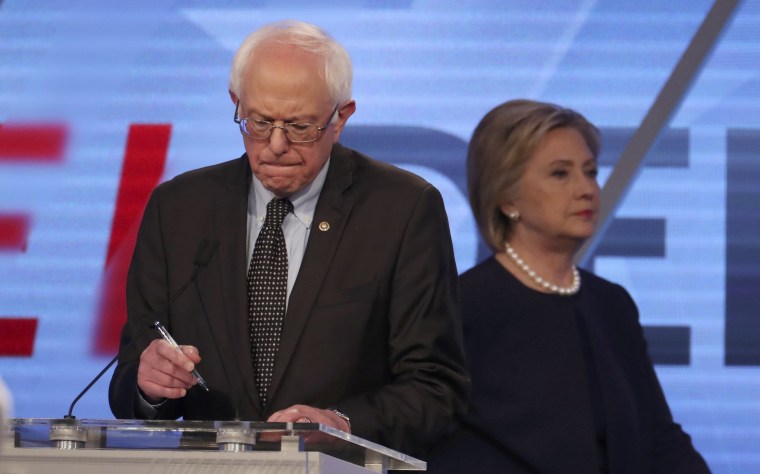Fresh off an upset victory in Michigan the night before, Bernie Sanders sparred with Hillary Clinton on immigration at a debate in Miami Wednesday night, ahead of Florida’s primary Tuesday.
Facing questions in English and Spanish at the debate, hosted by Univision and The Washington Post, Clinton and Sanders drew a sharp line in the sand on deportation policies, which could haunt them down the road: Both pledged they would not deport children nor undocumented adults without criminal records.
Univision host Jorge Ramos notably pressed Clinton, who in the past took a hard line in calls to deport a surge of migrant children. Asked if her newly compassionate approach toward deportation policies extended toward adults, the former secretary of state appeared to include even immigrants caught entering the U.S. illegally in the past.
"Of the undocumented people living in our country, I do not want to see them deported, I want to see them on a path to citizenship," Clinton said.
That’s a notable split from the policies of President Obama, especially for Clinton, who has repeatedly dinged Sanders for breaking with Obama in the past and pledged to continue his policies.
It also set high expectations on immigration for whomever emerges as the Democratic nominee. Both candidates have vowed to introduce comprehensive immigration reform as a priority, and their promises to not deport broad swaths of the 11 million undocumented immigrants living in the country raises the stakes — particularly in the face of a divided government.
Obama faced similar challenges in 2008, when he was a presidential candidate and promised Ramos that he would implement immigration reform in his first term. While the president has since implemented programs to protect 5 million undocumented immigrants from deportations, that interview has since stung him, earning him the label of the “deporter in chief” after he failed to pass reform.
“I do not have the same policy that the current administration does,” Clinton said.
Sanders expressed a similar stance, adding that while he aligns with Obama on most things, “he is wrong on this issue of deportation, I disagree with him.”
But both spent most of the discussion on immigration accusing the other of flip-flopping and pandering to Hispanics on the issue, unloading opposition research about past votes and statements.
Sanders hit Clinton with her infamous bungled answer on drivers licenses for undocumented immigrants in a 2008 Democratic primary, which has continued to haunt her long after she walked it back.
Clinton countered with Sanders’ vote against a 2007 immigration law backed by the late Sen. Ted Kennedy. Sanders said he voted against the law because it included a guest worker program that many Latino and civil rights group opposed.
Then the senator fired back by bringing up Clinton’s comments during the 2014 border crisis that Central American children should be sent back. And Clinton returned fire by noting Sanders voted for a bill favored by the Minutemen movement, the vigilantes who patrol the U.S.-Mexico border.
“No, I do not support vigilantes and that is a horrific statement, an unfair statement to make,” Sanders said.
The debate went into the weeds on Senate procedure and while campaign staff flooded reporters’ inboxes with fact checks and research, both candidates — who have spent decades in public life as feelings on immigration have evolved — emerged with muddied and imperfect records on the issue.
Clinton also faced tough questions about why her private email server, why many Americans don’t find her honest, and also Benghazi, which prompted boos from the audience of Democratic voters.
Asked if she would drop out of the race if she were to be indicted for having classified information on her server, she replied curtly: ”Oh for goodness — that is not going to happen, I’m not going to answer that question.”
But she also found a way to turn this weakness in a strength by being forthcoming and vulnerable, exposing a bit of herself voters long for in an cycle dominated by a demand for authenticity. “This is not easy for me,” she said. “I am not a natural politician, in case you haven’t noticed, like my husband or President Obama.”
And she once again showcased her ability to connect with voters on an individual level, while Sanders seems most comfortable behind a podium. “Please know how brave I think you are, coming here,” Clinton told an audience member who said her family had been separated by immigration policies. “I want you to know that in the work that I’ve done, the families I’ve met, I’ve heard similar stories.”
Naturally, Donald Trump and his comments about immigrants loomed large in the debate, with both candidates competing to trash him harder.
Clinton stopped short, however, of calling the Republican front-runner a racist. Instead, she mocked his plan to build a border wall with Mexico and make that country pay for it. “It will be the most beautiful, tall wall, better than the Great Wall of China,” she said impersonating the billionaire.
Sanders went further in responding to the question, saying Trump has “resorted to racism and xenophobia and bigotry.”
Meanwhile, Sanders earned boos from the South Florida audience when a clip was played of the then-mayor of Burlington seemingly defending Fidel Castro by noting the dictator provided a generous social safety net for citizens. Pressed by moderators, Sanders did not disavow his earlier comments.
“What that was about was saying that the United States was wrong to try to invade Cuba, that the United States was wrong trying to support people to overthrow the Nicaraguan government, that the United States was wrong trying to overthrow in 1954 the democratically elected government of Guatemala,” he said.

